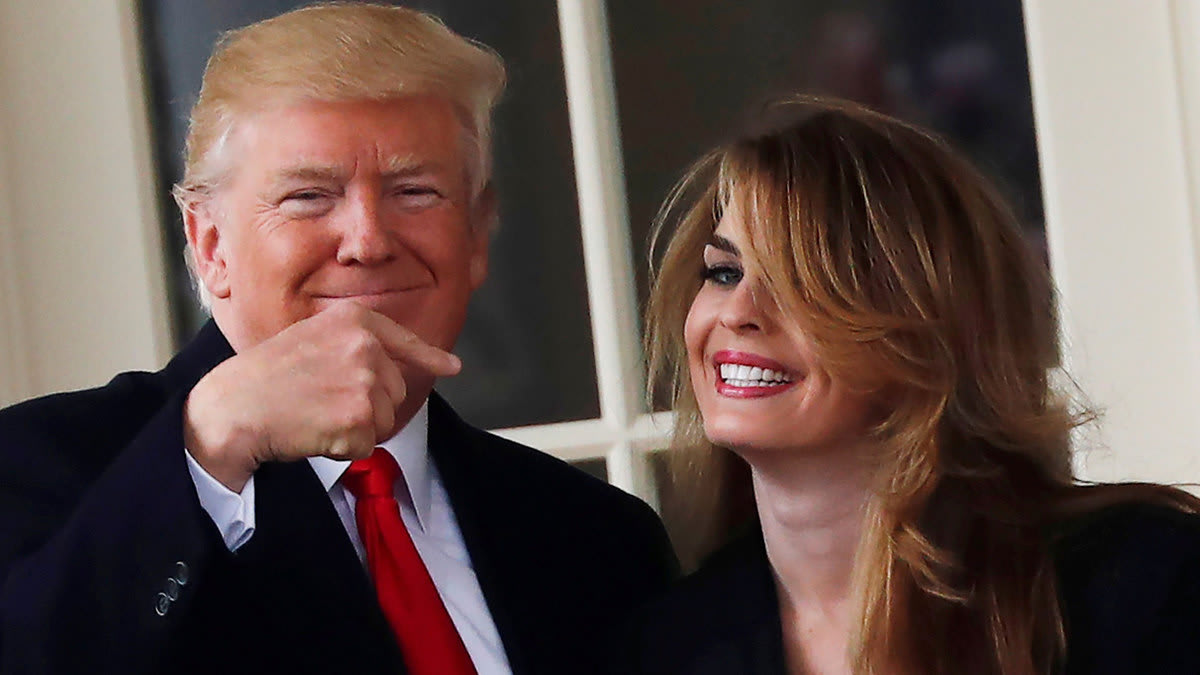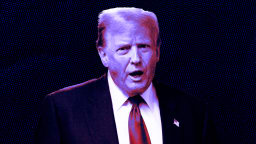Hope Hicks Breaks Down on the Stand
Trump’s former political PR guru testified on his 11th day of trial.

Carlos Barria/Reuters
Hope Hicks, Donald Trump’s first political PR guru and presumed holder of all his dirty secrets, started crying on the stand as the former president’s legal team questioned her at his New York criminal trial on Friday.
Hicks instantly broke down when Trump defense lawyer Emile Bove began his cross-examination, asking her about how she was initially hired to work with the Trump Organization. After a brief break was called to allow her to compose herself, Hicks returned to the stand, taking deep breaths and refusing to look in Trump’s direction.
From the moment she walked into the courtroom at 11:30 a.m., the atmosphere immediately changed. The 35-year-old publicist—who normally carries herself confidently and owns the room—slowly made her way into the courtroom through a side door that’s disguised as a wall panel and uneasily made her way past the red-velvet rope that separates the battle area from the public pews. She kept her head down, with her feathered blonde hair drooping over her eyes as she gripped a black purse in her left hand.
Once she sat down, Hicks barely squeaked out an introduction.
“Hi, my name is Hope Charlotte Hicks, and my last name is spelled H-I-C-K-S,” she said, apologizing for being nervous.
But after a few minutes, she began to sit up straighter and speak more firmly as she began detailing the way she entered Trump’s orbit. She recalled landing a job at the Trump Organization as its communications director and how it slowly morphed into a PR role on his 2016 presidential campaign.
Prosecutors hope to use Hicks as a witness who can add crucial details about Trump’s involvement in directing hush-money payments to former “playmate” Karen McDougal and porn star Stormy Daniels before the 2016 election. Trump is currently on trial facing 34 felony counts of falsifying business records over the way he paid his consigliere Michael Cohen after the since-disgraced lawyer closed these deals.
Few knew what to expect from her testimony. Hicks remained close to the Trump family even after she left her role in 2018 after serving as his longest tenured political aide. She became the Fox Corporation’s top flack then returned to the White House at the tail end of his administration.
However, she’s already been burned by staying so close to Trump—evident by her private remarks after witnessing how Trump’s violent rhetoric and rejection of legitimate 2020 election results brought about the insurrectionist attack on the U.S. Capitol by his supporters.
As the House of Representatives committee that investigated the Jan. 6 riot eventually uncovered, Hicks texted Ivanka Trump’s then-chief of staff, “We all look like domestic terrorists now.” She later added, “And all of us that didn’t have jobs lined up will be perpetually unemployed.”
During her testimony midday Friday, prosecutors just barely started to explore her involvement in the pivotal events that led the Manhattan District Attorney’s Office to indict Trump on charges that could send him to a state prison for up to four years.
That includes the release of the Access Hollywood tape that put Trump’s 2016 campaign on a death spiral, incentivizing him to silence Stormy Daniels from delivering a coup de grâce. But as they worked their way through the details, Hicks looked increasingly uncomfortable—and kept her eyes locked on the unassuming prosecutor in a dark gray suit, Matthew Colangelo.
Hicks remembered first hearing about Trump’s infamous “grab ’em by the pussy” hot mic comment in an email from The Washington Post reporter David A. Fahrenthold, which forced her to race up to Trump Tower’s 25th floor. There, she found Trump doing presidential debate prep with campaign advisers Kellyanne Conway, Jason Miller, and Stephen Miller, far-right instigator Steve Bannon, Trump son-in-law Jared Kushner, and former New Jersey Gov. Chris Christie.
“We weren’t sure how to respond yet. We were trying to gather information and absorb the shock of it,” she said. “He said that didn’t sound like something he would say.”
But she became a bit uneasy when she started addressing Trump’s reactions.
“Was Mr. Trump upset?” Colangeo asked.
“Um, yes. Yeah, he was,” she said with a sigh.
“What was your first reaction when you heard the tape?” he continues.
“Um…” she said with a smile. “A little stunned.”
“Just… yeah,” she shook her head and turned to the jury. “Yeah, it’s hard to describe.”
Hicks turned back to the prosecutor.
“It was concerning… I had a good sense that this was going to be a massive story and dominate the news cycle for the next several days at least.”
After a pause, she shifted her gaze toward the right, which would have her face her former boss–except she kept her eyes in the empty space above his head and tightened her lips.
“It was a damaging development,” she added. “It just didn’t feel like the kind of story that—at least it wasn’t helpful. There were a lot of layers to it that complicated where we were trying to go. This was kind of pulling us backwards in a way that was going to be hard to overcome.”
“I think there was consensus amongst us all that the tape was damaging and this was a crisis,” she said, taking a deep breath.
Prosecutors want to be careful as they establish exactly what went on in the Trump campaign during those fateful moments and try to connect the dots between the fallout from that tape and Trump’s alleged decision to approve a hush-money payment to Stormy Daniels.
Hicks, an experienced publicist who stuck by Trump through dozens of scandals during his time in office, surely knows the stakes. And she proceeded carefully as she described how the campaign didn’t start wondering until the next day how to contain the potential repercussions with female voters.
“Houses later… maybe the next day. Not in that moment, but certainly eventually that was something that was raised,” she testified.
Colangeo asked her whether there was internal chatter about how the campaign could respond.
“I know Mr. Trump felt like this wasn’t good. But it was also just like, two guys talking privately… locker room talk…wasn’t anything to get so upset over. Certainly didn’t want to offend anybody, but he felt like this was pretty standard stuff for two guys chatting with each other.”
Prosecutors then showed jurors Trump’s official response at the time, a statement that read, “This was locker-room banter, a private conversation that took place many years ago. Bill Clinton has said far worse to me on the golf course—not even close. I apologize if anyone was offended.”
After another half hour or so of questions, Justice Juan Merchan paused the trial for a lunch break.
On her way out, Hicks kept her eyes down and quickly made her way out the side exit, guided by a law enforcement officer.
But the dynamic changed completely when Hicks returned from lunch—cried on the stand—then returned to answer more questions from Trump’s lawyer.
Bove kept his cross-examination friendly, and the strategy appeared to work: reigning in a former close ally to the family. Bove allowed Hicks to wax nostalgic about her role on the Trump 2016 campaign, inviting her to speak warmly about her relationship with the real estate tycoon’s family. But then he turned her attention to Cohen.
As the day was coming to a close, Bove made sure jurors could see him drive a wedge between Cohen and the Trump presidential campaign, making Cohen out to be a self-interested, attention-hungry opportunist who screwed up everything he touched.
“He would try to insert himself at certain moments. But he wasn’t supposed to be on the campaign in any official capacity. There were some things he did in a voluntary capacity because of his interest,” she recalled. “I think he put together.. a diversity coalition at some point. But he wasn’t looped in on the day to day of the campaign strategy staff plans.”
But Bove pressed on, asking if Cohen was more of a “campaign surrogate.”
“He was speaking as an employee of the Trump Organization who had experience working with Mr. Trump,” she clarified.
Bove then went in for the kill.
“There were times he did things that were frustrating to the campaign right?” he asked.
Hicks’ tone flipped like a light switch.
“Yes,” she said, sharply.
Bove suggested that Cohen at times “went rogue.”
“Yes. There were things he did that were not helpful,” she said. “I used to say that he liked to call himself a fixer or Mr. Fix It, and it was only because he first broke it.”
The courtroom erupted in laughter, and even Hicks chuckled mid-sentence. From about that point onward, Hicks—who until that moment had consistently referred to her former boss as “Mr. Trump”—picked up on Bove’s manner of speech and began to refer to him as “President Trump.” She spoke proudly of her time in his employ.
Bove wrapped up his cross-examination by asking whether she, working in the nation’s capital, had anything to do with the Trump Organization’s business records at a building 200 miles away up in New York City. Hicks assured she did not. It was a defense play to make Hicks seem irrelevant to the nuts and bolts of this case, which rest on the falsification of business documents.
When it was their turn to ask her follow-up questions, prosecutors passed on the opportunity.
On her way out, Hicks appeared to steal a quick glance at Trump out of the corner of her eye. She exited from a side door with her head bowed low.




No comments:
Post a Comment